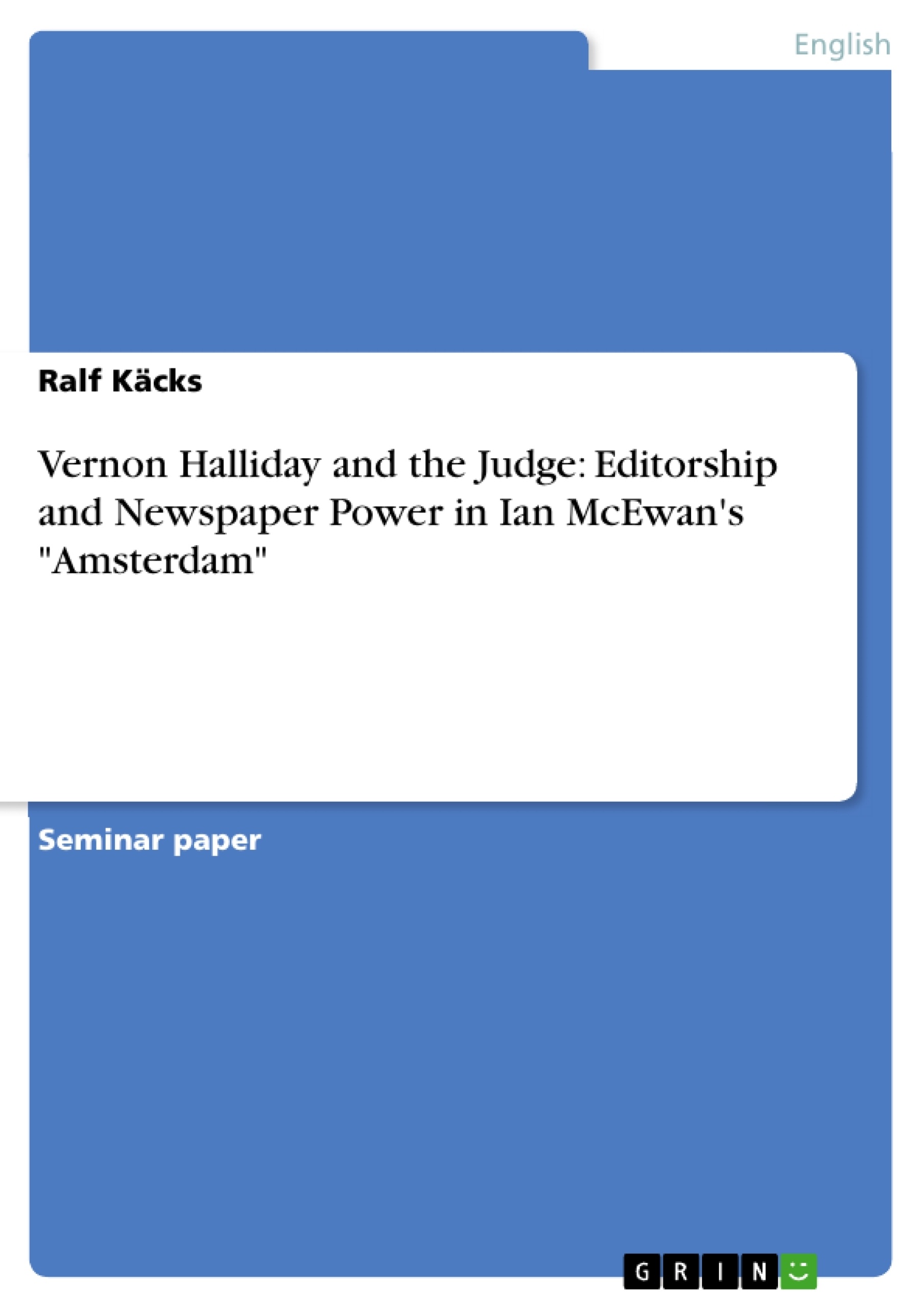Ian McEwan′s ability to present his settings and themes in detail has been already noticed. In his novel Amsterdam he exellently describes for example the Lake District when Clive Linley hikes to find inspiration or the composing process when Clive tries to write the perfect ending for his symphony. But these are not the only passages where he uses his knowledge of perfectly drawing the reader into a certain theme. He also shows in this novel that he has deep insight into the media and especially in how modern newspapers are made.
Media and especially the newspaper is one of Ian McEwan′s main themes in Amsterdam. Besides Vernon Halliday, who as the editor of the British national daily The Judge is the character the most involved in the printing press, also George Lane and McEwan′s secret main character Molly Lane are linked with the media. George owns a small part of the Judge and therefore is one of the proprietors to whom Vernon is responsible. Molly was part of the media establishment as well. She worked as critic for a magazine and later married George.
I will show in this paper that McEwan succeeded in portraying his character Vernon Halliday in a way that strongly resembles an editor of a national daily newspaper in Great Britain today. He even managed to hint at changes that happened during the last decades in how editorship is characterized by using George Lane as old fashioned proprietor to counterbalance the modern editorship of the Judge. It will also become obvious how comprehensive McEwan′s knowledge of the relationship between the media and politics is and how he weaved this aspect into the novel. Furthermore, I will point out that Ian McEwan portrays the Judge throughout his novel as a quality paper on its way to become a downmarket tabloid. By doing this the author again achieves to establish a direct link to current criticism of British national newspapers.
Inhaltsverzeichnis (Table of Contents)
- Introduction
- Vernon Halliday and ,,Entrepreneurial Editorship“
- George and Vernon - The Owner-Editor Relationship
- The Judge, Vernon and Politics
- Steering the Judge Downmarket
- Conclusion
- Bibliography
Zielsetzung und Themenschwerpunkte (Objectives and Key Themes)
This paper explores the portrayal of Vernon Halliday, the editor of The Judge, in Ian McEwan's novel Amsterdam. It examines how McEwan uses the character of Vernon to depict the modern entrepreneurial editor in the British national newspaper industry. The paper also investigates the relationship between the media and politics in the novel, highlighting the influence of ownership on editorial decisions. Finally, it analyzes how McEwan portrays The Judge as a quality newspaper transitioning towards a downmarket tabloid.
- Vernon Halliday's character as a modern entrepreneurial editor
- The relationship between ownership and editorship in The Judge
- The influence of politics on the media
- The transformation of The Judge from a quality newspaper to a downmarket tabloid
- Ian McEwan's portrayal of the British national newspaper industry
Zusammenfassung der Kapitel (Chapter Summaries)
- Introduction: This chapter introduces the main themes of the paper, focusing on Ian McEwan's depiction of the media and newspaper industry in Amsterdam. It introduces Vernon Halliday, the editor of The Judge, as a key character who represents the modern entrepreneurial editor. The chapter also highlights the importance of the relationship between the media and politics in the novel.
- Vernon Halliday and ,,Entrepreneurial Editorship“: This chapter focuses on Vernon Halliday's character, examining how McEwan portrays him as a modern entrepreneurial editor. It analyzes Vernon's career progression and his decision-making process, highlighting the characteristics that define him as a modern media professional.
- George and Vernon - The Owner-Editor Relationship: This chapter explores the relationship between Vernon Halliday and George Lane, one of the proprietors of The Judge. It examines how their different perspectives on newspaper ownership and editorship create tension and influence editorial decisions.
- The Judge, Vernon and Politics: This chapter investigates the influence of politics on The Judge and Vernon Halliday's role in navigating this relationship. It analyzes how political events and figures impact editorial choices and the overall direction of the newspaper.
- Steering the Judge Downmarket: This chapter examines McEwan's portrayal of The Judge's transformation from a quality newspaper to a downmarket tabloid. It analyzes how the newspaper's editorial decisions and content shift to cater to a broader, less discerning audience.
Schlüsselwörter (Keywords)
The key terms and concepts explored in this paper include: entrepreneurial editorship, media ownership, political influence, quality journalism, tabloidization, British national newspapers, Ian McEwan, Amsterdam, The Judge, Vernon Halliday.
How does Ian McEwan portray the character Vernon Halliday?
McEwan portrays Vernon Halliday as a modern "entrepreneurial editor" of a national daily, showcasing his decision-making processes and his navigation of media power.
What is the significance of the newspaper "The Judge" in the novel?
"The Judge" serves as a representation of the British quality press transitioning into a downmarket tabloid, reflecting current criticisms of the newspaper industry.
How is the relationship between media and politics explored?
The novel highlights how editorial choices are influenced by political figures and events, as well as the personal agendas of those in power within the media establishment.
Who is George Lane and what is his role?
George Lane is an "old-fashioned" proprietor of The Judge. His relationship with Vernon illustrates the tension between traditional ownership and modern editorial management.
What does the term "Steering the Judge Downmarket" refer to?
It refers to the deliberate shift in the newspaper's content and ethics towards sensationalism and tabloid-style journalism to attract a broader audience.



